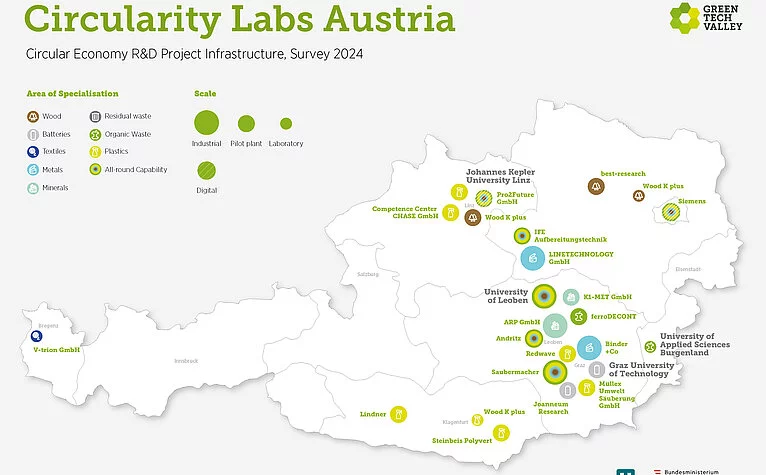 © Green Tech Valley
© Green Tech Valley
- Location advantages
- Innovation and digitalisation
- Research & development
- News
How Austria is pushing ahead with technologies for the circular economy
16. January 2025Austria bundles its expertise and numerous opportunities for cooperation on behalf of the business sector. Companies and research institutions also benefit from this. This approach is demonstrated by best practice examples such as Green Tech Valley.
With more than 25 practical laboratories along eight material flows, Austria has a uniquely high density of practical research laboratories for the circular economy in Europe. They bundle the expertise of research institutions, competence centres and industry and are largely operated by companies as a means of promoting closed material cycles. This is also clearly highlighted on the "Circularity Labs AustriaCircularity Labs Austria ()" map. It was created by Green Tech Valley together with the Federal Ministry for Climate Action, Environment, Energy, Mobility, Innovation and Technology and the University of Leoben, which is one of Europe's leading “recycling universities”.
Strong network for Green Tech
"National and international customers can access these laboratories and benefit from the combined know-how and industrial scale of the facilities,” explains Bernard Puttinger, CEO of Green Tech Valley “This unique ecosystem supports their efforts to obtain new raw materials from practical trials with their existing waste. As a result, companies around the world can gradually close their material cycles.” Facilities include Linetechnology for metals, V-trion in Vorarlberg for textiles, Redwave for plastics and BEST-Research for wood. Further assistance such as green transformation maps support companies of various sizes on their path to success.
The Green Tech ValleyGreen Tech Valley () in Styria and Carinthia brings together the expertise of over 300 companies such as Andritz and ATM RecyclingsystemsATM Recyclingsystems () as well as research institutions: More than 20 global technology leaders and over 60 startups have established business operations there to leverage the conducive environment of this strong network. They conduct research and develop new technologies for the circular economy and renewable energies. 14 out of the 18 Austrian Competence Centers for Excellent Technologies (COMET) are located here.
Best practice: Recovering raw materials
AndritzAndritz () is a best practice example. For example, this international technology group based in Graz offers recycling solutions for waste. At the Andritz Recycling Technology Centre, state-of-the-art industrial machinery is used to improve the manual and mechanical processing of a wide range of raw materials. The company is currently collaborating with the American start-up Circ to develop the first large-scale recycling plant designed to recover cotton and polyester from mixed textile waste. The plant is expected to process 200 tonnes of textile waste per day.
The Italian startup DurameaDuramea () has also set up business operations in Graz. This FlexCoFlexCo () (flexible company) was founded in November 2024. The company specializes in the development and production of innovative membrane electrode assemblies (MEAs), a key component in technologies that enable clean energy production and storage. More specifically, the startup focuses on developing MEAs that improve the efficiency, performance, and durability of these systems, making them more cost-effective and reliable for various applications. MEAs are used in polymer electrolyte fuel cells (PEMFCs) and anion exchange membrane water electrolyzers (AEMWE).
As a spin-off of the Institute of Chemical Engineering and Environmental Technology at the Graz University of Technology, Duramea benefits from cutting-edge research and close collaboration with academic and industrial partners. Duramea is a partner in the Jeffree project of the Austrian Research Promotion Agency. This project is developing new technologies for fuel cells that do not require environmentally harmful PFAS chemicals.
"Austria offers an exceptional environment for innovation, with outstanding funding opportunities and a highly skilled workforce,” states Rene Maiberg, CEO of Duramea. “The country is a leader in hydrogen technologies, making it the ideal location for our endeavors. ABA’s strong national and international network succeeded in playing a crucial role in bringing us together with key business partners and investors," he adds.
More about GreenTech and CleanTech in AustriaMore about GreenTech and CleanTech in Austria ()